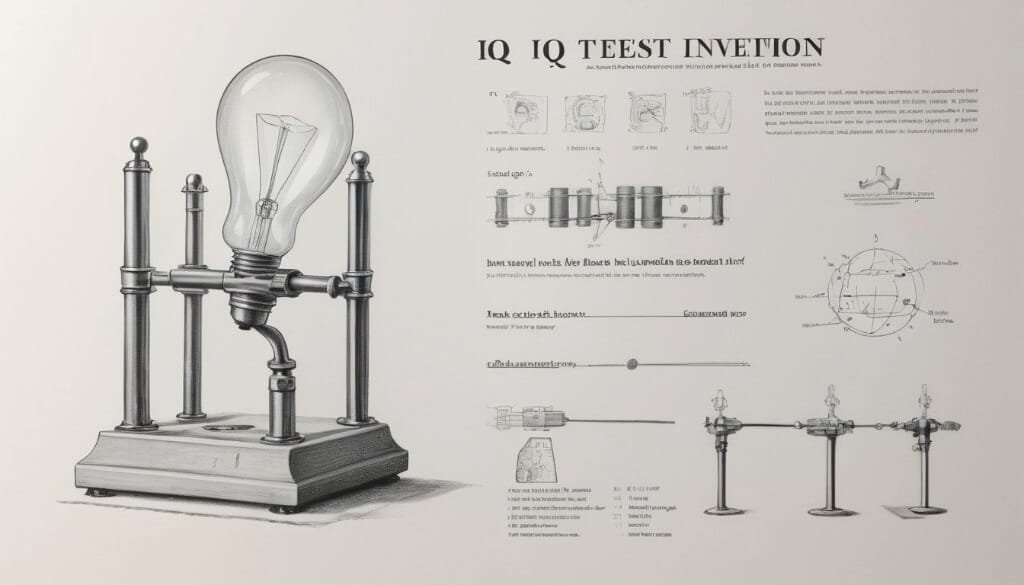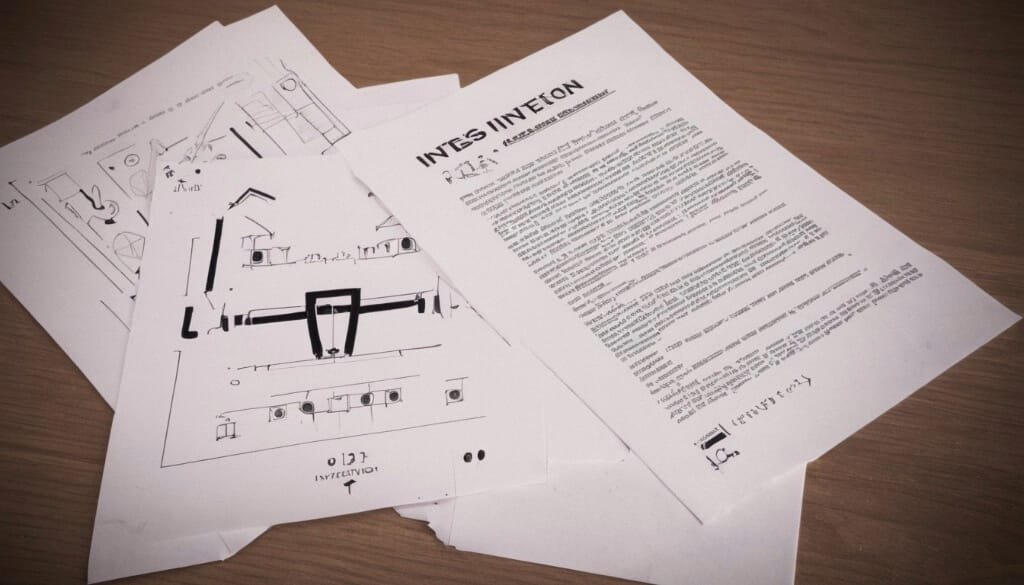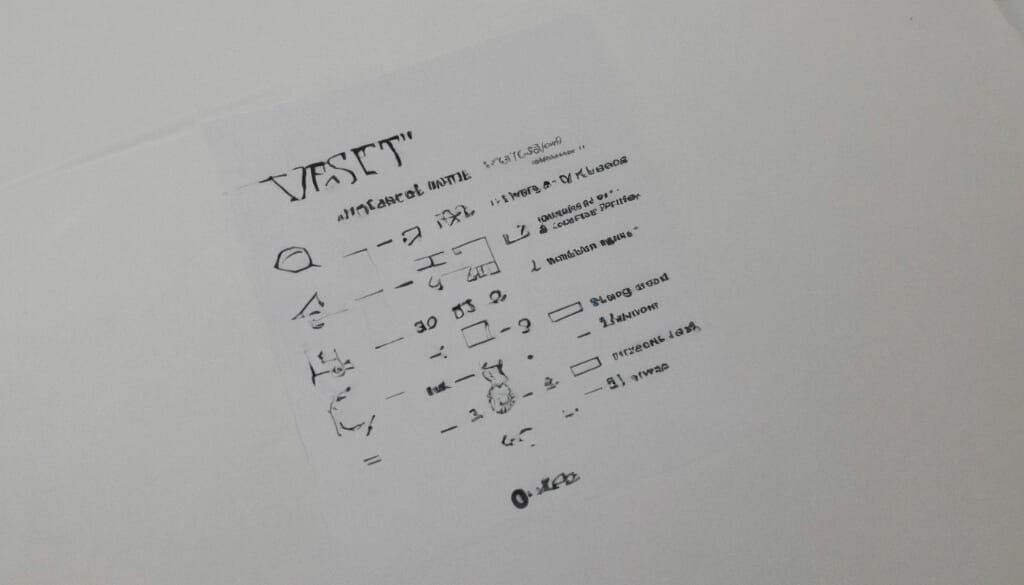IQ tests, ubiquitous in modern society, serve as a measure of cognitive abilities and intelligence. Yet, their origins remain shrouded in historical complexity and debate. Understanding the genesis of these tests not only sheds light on their development but also raises critical questions about their validity and relevance today. So, who invented IQ tests, and what factors shaped their creation?

Early Concepts Of Intelligence
Throughout history, various cultures have grappled with the notion of intelligence, albeit in different forms and contexts. Ancient civilizations often associated intelligence with divine gifts or innate abilities bestowed upon select individuals. However, it wasn’t until the 19th century that modern notions of intelligence began to take shape.
During this period, thinkers such as Francis Galton and Sir Francis Bacon laid the groundwork for understanding intelligence more systematically. Galton, a cousin of Charles Darwin, proposed the concept of eugenics and conducted extensive studies on hereditary traits, aiming to quantify and classify human abilities.
However, it was Sir Francis Galton’s work that laid the groundwork for the development of IQ tests as we know them today. Drawing from his studies on heredity and individual differences, Galton advocated for the measurement of human intelligence through standardized tests. His ideas sparked interest among psychologists and educators, setting the stage for further exploration into intelligence testing.
The term “IQ,” or Intelligence Quotient, was coined by the French psychologist Alfred Binet in the early 20th century. Binet, along with his colleague Theodore Simon, sought to create a method for identifying students who might require additional educational support. Their pioneering work led to the creation of the Binet-Simon Scale, which measured various cognitive abilities such as memory, attention, and problem-solving skills.
Binet’s contributions to the field of psychology were monumental, yet it’s important to acknowledge that the development of IQ tests was a collaborative effort involving multiple researchers and scholars. While Binet and Simon laid the foundation, others, such as Lewis Terman in the United States, further refined and popularized IQ testing through instruments like the Stanford-Binet Intelligence Scale.
The concept of intelligence and its measurement continued to evolve, shaped by advances in psychology, neuroscience, and psychometrics. Today, IQ tests remain one of the most widely used tools for assessing cognitive abilities, despite ongoing debates surrounding their validity and fairness.
The invention of IQ tests was not the work of a single individual but rather a culmination of ideas and efforts spanning centuries. From ancient beliefs to modern psychometrics, the concept of intelligence has undergone significant transformation, reflecting the ever-changing landscape of human understanding and inquiry.
Birth Of IQ Testing
The birth of IQ testing marks a significant milestone in the history of psychology, representing a concerted effort to measure and understand human intelligence systematically.
In the late 19th and early 20th centuries, there was a growing interest among psychologists in developing standardized methods for assessing cognitive abilities. This interest was fueled by several factors, including advancements in the study of individual differences, the rise of educational psychology, and the need to identify individuals who might require special educational interventions.
At the forefront of this movement was the French psychologist Alfred Binet, whose work laid the foundation for the development of IQ tests. In collaboration with his colleague Theodore Simon, Binet sought to devise a method for identifying children who might struggle in school and require additional support.
In 1905, Binet and Simon introduced the first version of what would later become known as the Binet-Simon Scale. This pioneering test consisted of a series of tasks designed to measure various cognitive abilities, such as memory, attention, and problem-solving skills. The results were used to calculate a child’s mental age, which could then be compared to their chronological age to determine their level of intelligence.
The Binet-Simon Scale represented a significant departure from previous methods of assessing intelligence, which often relied on subjective judgments or anecdotal evidence. By introducing standardized tasks and procedures, Binet and Simon provided a more objective and reliable means of measuring intelligence.
The concept of the Intelligence Quotient, or IQ, emerged from Binet’s work. Binet proposed that intelligence could be quantified by dividing a child’s mental age by their chronological age and multiplying the result by 100. This formula allowed for the creation of a single numerical score that could be used to compare individuals’ intelligence levels.
The Binet-Simon Scale quickly gained popularity and was adapted and translated into various languages around the world. In the United States, psychologist Lewis Terman played a key role in popularizing IQ testing through his revision of the Binet-Simon Scale, known as the Stanford-Binet Intelligence Scale.
The Stanford-Binet Intelligence Scale, first published in 1916, became one of the most widely used IQ tests in the United States and laid the groundwork for future developments in the field of psychometrics.
The birth of IQ testing can be traced back to the pioneering work of Alfred Binet and Theodore Simon, who sought to develop a standardized method for assessing intelligence. Their efforts paved the way for the creation of IQ tests and revolutionized the field of psychology, providing researchers and educators with valuable tools for understanding and measuring human intelligence.
Controversies And Criticisms
While IQ tests have become integral to various aspects of society, including education, employment, and psychology, they have also been subject to considerable controversy and criticism.
Ethical Concerns Surrounding IQ Testing
One of the primary areas of contention revolves around the ethical implications of IQ testing, particularly concerning issues of fairness, bias, and discrimination. Critics argue that IQ tests may disproportionately disadvantage certain groups, such as minority populations or individuals from low socioeconomic backgrounds. This is due to factors such as cultural biases embedded in test questions, differential access to educational resources, and socio-cultural differences in test-taking attitudes and behaviors.
Cultural Biases In Early Tests
Early versions of IQ tests, including the Binet-Simon Scale and the Stanford-Binet Intelligence Scale, were developed primarily within Western cultural contexts. As a result, they may not accurately capture the full range of cognitive abilities and experiences across diverse cultural groups. Critics contend that these tests reflect the values, norms, and experiences of the dominant culture, leading to potential misinterpretation of intelligence and reinforcing existing inequalities.
Impact Of Eugenics Movement On IQ Testing
Another source of controversy surrounding IQ testing is its historical association with the eugenics movement. During the early 20th century, proponents of eugenics sought to apply principles of selective breeding to improve the human gene pool. IQ tests were used as a tool to justify discriminatory policies and practices, such as forced sterilization and immigration restrictions, based on notions of intellectual superiority and inferiority. This dark chapter in the history of IQ testing has contributed to lingering concerns about the potential misuse of intelligence assessments for discriminatory purposes.
Despite these criticisms, proponents of IQ testing argue that when used appropriately and in conjunction with other measures, such as academic performance, cognitive assessments can provide valuable insights into individuals’ abilities and potential. They contend that modern IQ tests have undergone rigorous development and validation processes to minimize biases and ensure fairness across diverse populations.
Addressing Cultural Bias And Fairness
In response to concerns about cultural bias, efforts have been made to develop culturally fair IQ tests that account for the diverse backgrounds and experiences of test takers. These tests aim to minimize the influence of cultural factors on test performance while still assessing core cognitive abilities accurately.
Promoting Ethical Use Of IQ Tests
Psychologists and educators emphasize the importance of using IQ tests ethically and responsibly, recognizing their limitations and potential for misuse. Guidelines and standards have been established to govern the administration and interpretation of IQ tests, with an emphasis on promoting fairness, equity, and respect for individuals’ rights and dignity.
While IQ tests have played a significant role in understanding and measuring human intelligence, they are not without controversy and criticism. Ethical concerns, cultural biases, and historical associations with eugenics have fueled debates about the validity, fairness, and appropriate use of IQ testing. Moving forward, it is essential to address these concerns through ongoing research, critical dialogue, and a commitment to promoting equity and inclusion in intelligence assessment.
Evolution Of IQ Testing
The evolution of IQ testing represents a dynamic journey marked by continuous refinement, innovation, and adaptation to changing societal needs and scientific advancements.

Development Of Alternative Tests And Theories
In response to the limitations and criticisms of early IQ tests, researchers have developed alternative measures of intelligence that encompass a broader range of cognitive abilities and cultural contexts. For example, Howard Gardner’s theory of multiple intelligences proposed that intelligence is not a single, unitary construct but rather a multifaceted phenomenon encompassing distinct domains such as linguistic, logical-mathematical, spatial, and interpersonal abilities. Gardner’s theory challenged the notion of a single IQ score as the sole indicator of intelligence and highlighted the importance of recognizing and valuing diverse forms of intelligence.
Introduction Of Wechsler Intelligence Scales
One of the most significant developments in the evolution of IQ testing was the introduction of the Wechsler Intelligence Scales by psychologist David Wechsler in the mid-20th century. Unlike earlier tests that focused primarily on verbal and nonverbal cognitive abilities, the Wechsler scales expanded the assessment to include additional factors such as processing speed, working memory, and perceptual reasoning. The Wechsler Adult Intelligence Scale (WAIS) and the Wechsler Intelligence Scale for Children (WISC) became widely used instruments for assessing intelligence across different age groups and populations.
Contemporary Approaches To Measuring Intelligence
In recent decades, advancements in technology and cognitive neuroscience have led to the development of innovative approaches to measuring intelligence. Neuroimaging techniques, such as functional magnetic resonance imaging (fMRI) and electroencephalography (EEG), have provided insights into the neural correlates of intelligence and cognitive processes, offering new avenues for understanding individual differences in cognitive functioning. Additionally, computerized adaptive testing (CAT) has emerged as a more efficient and precise method for administering IQ tests, allowing for tailored assessments based on individuals’ responses.
Despite these advancements, debates persist about the nature of intelligence and the most appropriate methods for measuring it. Some researchers advocate for a broader, more holistic approach that considers socio-emotional factors, creativity, and practical skills alongside traditional cognitive abilities. Others argue for continued refinement of existing IQ tests to address issues of fairness, validity, and cultural bias.
The evolution of IQ testing reflects ongoing efforts to develop more comprehensive, accurate, and culturally sensitive measures of intelligence. From the pioneering work of Alfred Binet to the contemporary advances in neurocognitive assessment, IQ testing continues to evolve in response to discoveries, changing societal needs, and evolving theoretical perspectives. As our understanding of intelligence continues to deepen, so too will the methods and tools we use to measure it, shaping the future of intelligence assessment and research.
Debates And Perspectives
The field of intelligence testing is rife with debates and diverse perspectives, reflecting the complexity and multifaceted nature of human cognition. These debates encompass a wide range of topics, from the fundamental nature of intelligence to the validity and fairness of IQ tests.
Nature Vs. Nurture In Intelligence
One of the most enduring debates in psychology revolves around the relative contributions of nature and nurture to intelligence. Proponents of the nature perspective argue that intelligence is primarily determined by genetic factors, with heredity playing a significant role in shaping cognitive abilities. In contrast, advocates of the nurture perspective emphasize the influence of environmental factors, such as upbringing, education, and socio-economic status, in shaping intelligence. While evidence suggests that both nature and nurture play important roles in intelligence, the exact balance between genetic and environmental influences remains a topic of ongoing research and debate.
The Ongoing Relevance Of IQ Tests In Modern Society
Despite the proliferation of alternative measures of intelligence and critiques of IQ testing, IQ tests continue to play a prominent role in various domains of society, including education, employment, and clinical practice. Proponents argue that IQ tests provide valuable insights into individuals’ cognitive abilities and potential, serving as useful tools for identifying academic strengths and weaknesses, guiding career decisions, and informing diagnostic assessments. However, critics caution against overreliance on IQ scores as the sole measure of intelligence, highlighting the limitations and biases inherent in standardized testing.
Critiques From Psychology And Education Fields
Within the fields of psychology and education, IQ testing has faced scrutiny and criticism for its narrow focus on cognitive abilities and its potential to perpetuate inequities. Critics argue that IQ tests fail to capture the full spectrum of human intelligence, neglecting important factors such as creativity, emotional intelligence, and practical skills. Furthermore, concerns have been raised about the cultural biases embedded in IQ tests, which may disadvantage certain groups, particularly those from minority or marginalized backgrounds. As a result, there has been a growing emphasis on developing more inclusive and culturally sensitive measures of intelligence that recognize and value diverse forms of human cognition.
In navigating these debates and perspectives, it is essential to approach intelligence testing with a critical and nuanced understanding, recognizing both the strengths and limitations of existing measures. While IQ tests have contributed valuable insights into human cognition, they are not without flaws, and their use must be informed by an awareness of the broader social, cultural, and ethical implications. Moving forward, it is imperative to continue advancing our understanding of intelligence and developing more comprehensive and equitable approaches to its assessment.
Cultural And Global Variations
Understanding intelligence within diverse cultural contexts is essential for developing fair and valid assessment tools that accurately capture the full spectrum of human cognitive abilities. Cultural and global variations play a significant role in shaping perceptions of intelligence and the methods used to assess it.
Adaptations Of IQ Tests In Different Cultures
One of the challenges in intelligence testing is ensuring that assessments are culturally fair and relevant across diverse populations. Traditional IQ tests, which were developed within Western cultural contexts, may contain biases and assumptions that do not apply to individuals from non-Western backgrounds. As a result, efforts have been made to adapt existing IQ tests or develop new culturally appropriate measures of intelligence that account for cultural differences in language, values, and ways of thinking. These adaptations often involve modifying test content, administration procedures, and scoring criteria to ensure that they accurately reflect the cognitive abilities of diverse populations.

Challenges In Cross-Cultural Comparisons
Cross-cultural comparisons of intelligence pose unique challenges due to variations in educational systems, socio-economic conditions, and cultural norms. For example, notions of intelligence may differ between cultures, with some placing greater emphasis on academic achievement, while others value practical skills or social competence. These cultural differences can influence performance on intelligence tests and complicate efforts to compare scores across different cultural groups. Researchers must carefully consider cultural factors when interpreting IQ test results and avoid making simplistic or ethnocentric assumptions about intelligence.
Cultural Bias And Its Implications For Test Validity
Cultural bias refers to the tendency of IQ tests to systematically underestimate or overestimate the intelligence of individuals from certain cultural backgrounds. This bias can arise from various sources, including language barriers, unfamiliarity with test formats, and differences in test-taking behaviors. Cultural bias undermines the validity and reliability of IQ tests, as it may lead to inaccurate assessments of individuals’ cognitive abilities and perpetuate inequalities in educational and employment opportunities. Addressing cultural bias requires ongoing research, collaboration, and sensitivity to the diverse experiences and perspectives of test takers.
Cultural and global variations profoundly influence the assessment of intelligence, necessitating careful consideration of cultural factors in the development and interpretation of IQ tests. By recognizing and addressing cultural biases, researchers can strive to create more inclusive and equitable assessment tools that accurately reflect the diverse capabilities of individuals around the world. Embracing cultural diversity in intelligence testing not only enhances the validity and fairness of assessments but also fosters greater understanding and appreciation of human cognitive diversity across cultures.
The Future Of IQ Testing
As technology advances and our understanding of cognition deepens, the future of IQ testing remains uncertain. Alternative measures of intelligence, such as emotional intelligence and multiple intelligences theory, challenge the narrow focus of traditional IQ tests. Ethical considerations regarding the responsible use of these tests also come to the forefront, prompting ongoing discussions about their utility and impact.
Final Thoughts
The question of who invented IQ tests is multifaceted, reflecting the complex interplay of history, psychology, and society. While Alfred Binet’s contributions are often credited as pivotal, the evolution of IQ testing is a collaborative effort shaped by various scholars and social forces. As we continue to grapple with the implications of intelligence testing, it is essential to approach these discussions with nuance and critical inquiry.
FAQs
Who Invented IQ Tests?
While Alfred Binet is often credited with pioneering IQ tests, their development was influenced by multiple individuals and factors, including Theodore Simon and Lewis Terman.
Are IQ Tests Still Relevant Today?
Despite ongoing debates, IQ tests remain widely used in various fields, including education, psychology, and employment. However, their limitations and potential biases necessitate careful interpretation and consideration of alternative measures of intelligence.
Also Read: The Revolutionary Kinetoscope
